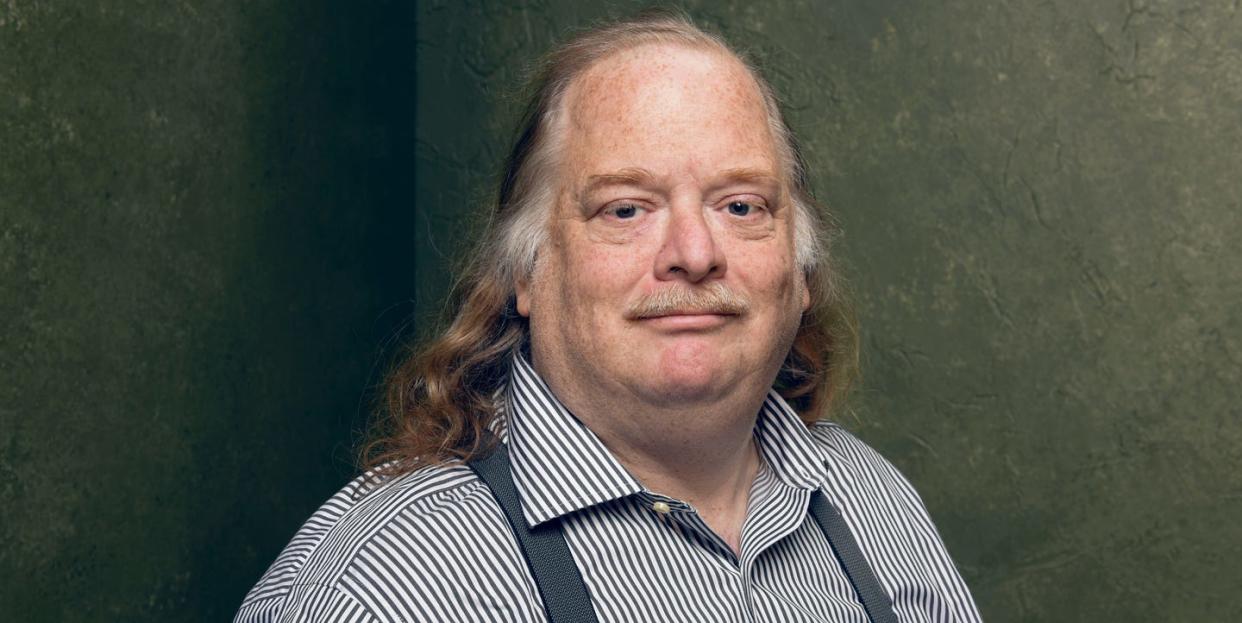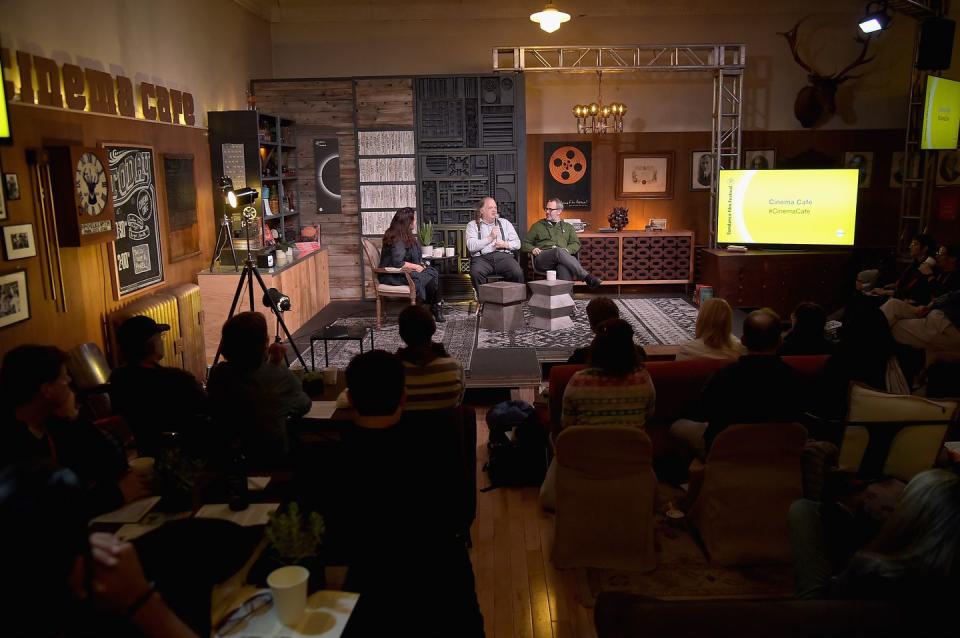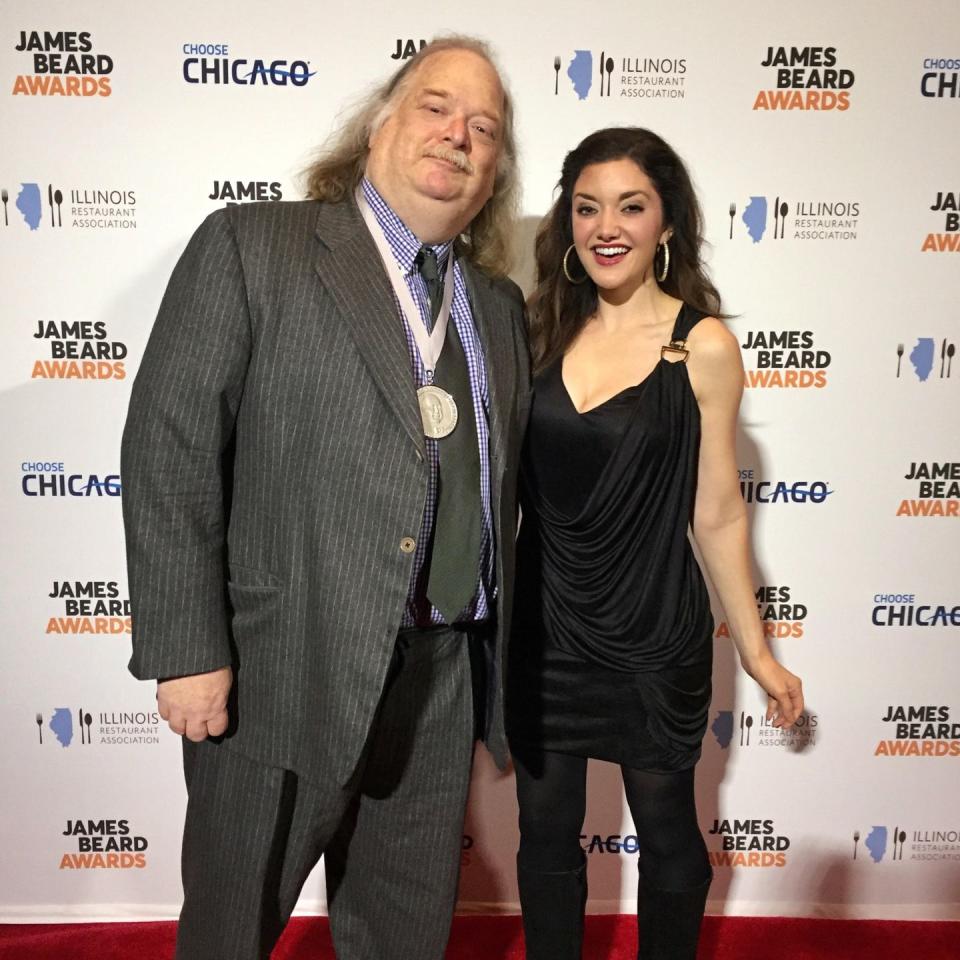What Jonathan Gold Taught Me About Food, Writing, and Losing Time to Cancer

I stood a few feet away, silent and uncertain. "Do we say...hi?" I asked my wife. “Should we?” People surrounded him, congratulating him, stealing time more precious than I knew. One year ago, on a late April night in a ballroom on the Chelsea Piers in New York, I drew a deep breath, moved in, and extended a hand to Jonathan Gold. "Hi. I’m Baxter."
I congratulated him on winning another James Beard Award (his eighth), told him I loved his work, had been a huge fan for years. That’s all I prepared; enough to borrow 10 seconds of his life, nothing more, because I knew that the most acclaimed food writer in history-the only one to ever win a Pulitzer Prize-was busy, important, a legend in Los Angeles and far beyond. There was no way he knew me, but that was okay. Saying hello and being near him was enough.
But then he started talking. He did know me, knew my work, knew my whole career path as a sports journalist. He praised specific stories-a quirky magazine feature on NBA players’ love of wine and another on the league's obsession with peanut butter and jelly sandwiches. He praised my work as a beat reporter covering the Los Angeles Lakers. And how could I leave the Los Angeles Times (his paper) for the Boston Globe to cover the Celtics? Jonathan was Los Angeles, through and through, so his face even cringed as he said the word “Boston,” as if he’d bitten into a rotten piece of fruit. “The Celtics?” he asked me, his head cocked, betrayed. “How could you?”
Seconds turned into minutes, maybe five of them, and during each one, my heart pounded. I was overwhelmed-shocked that he knew my name, much less anything about me. As we talked, I knew I’d never forget this moment with Jonathan, that I’d cherish it forever. He took a photo with my wife, then he reached into his pocket, and pulled out his card.
“When we get back to L.A.,” he said, “let’s get dinner.”

Two days later, I woke in my in-laws' house in New Hampshire to news from my older brother: Mom had been feeling unwell and had to be taken to the emergency room, where surgery saved her life. The diagnosis came quick-cancer. The disease that has stolen so much from so many had come to my family’s front door. All I could think about was time, how much she’d have left, and if there was enough to say everything I wanted, to say everything she meant to me. People can forever tell you that life is fragile and fleeting, but you will never truly learn that lesson until, as my mom came to describe it, death is staring you in the face.
Doctors stabilized her and told us about the long and brutal road ahead. For my brothers and me, life became a series of staggered trips back home to Oklahoma to help during chemotherapy and radiation. When I was on the road, I called but never wanted to talk long, knowing that our chats, however meaningful and restorative, sapped her strength-energy better served in her daily fight to live.
In early July, I flew home, and after a trip to chemo, Mom and I stopped in a small town, Krebs, otherwise known as “Oklahoma’s Little Italy.” In its heart stands Lovera’s Market, housed in a small, stone structure that has been run by the same family for more than half a century.
The savory aromas of artisan cheeses, meats, olive oils, fresh breads, and pastries transported me back to small, family-owned markets in Italy, where my wife and I had married and honeymooned the summer before. Italian-imported goods stocked the shelves. How was this market even possible on this side of the Atlantic, let alone the plains of Oklahoma? I couldn’t believe it. Neither could my mother, who came alive with energy while exploring each aisle. We ordered a hand-made cannoli, the pastry shell straight from Sicily. While chemotherapy can sap one’s appetite, that wasn’t the case here: She savored it slowly and with her eyes closed, offering an mmmmm after each bite. Watching her disappear into it for just a moment almost brought me to tears. That night, we ate and shared stories, and in those hours together at the table, the doctors, the chemo, and even the diagnosis seemed to fade away.

I had brought my James Beard Medal with me, the one I (somehow) won for feature reporting on the same night I met Jonathan, and my mom proudly wore it around her neck, feeling its weight. I told her about the meeting, what a thrill it was, and how we planned on getting dinner that summer in Los Angeles, which, to me, was akin to an invite to the movies with Roger Ebert, or perhaps a bullfight with Ernest Hemingway. I had so much that I wanted to tell him-about how I had started reading him soon after moving to L.A. in 2009, how he introduced me to the city just as he had for untold thousands, how his poetic prose and vivid descriptions were both inspiring (because they showed me what was possible) and deflating (because they left me feeling that I could never do that). But, more than anything, I wanted to tell him that those stories he liked-about PBJ, about wine-existed because of him, in a way. Because I had come to realize that what made Jonathan Gold so special was that he introduced different people and cultures through something universal, something human: food. And I had realized that some of those same connections could be forged in sports journalism, helping readers feel more connected to athletes with whom they otherwise had no way of understanding.
More than anything, I just wanted to tell him, "Thank you."
I emailed with Jonathan soon after our talk, again wishing him well after winning the award. “When I mentioned to a couple of people that I'd met you Friday, they all mentioned how much they'd loved the pbj piece,” he wrote back. “Not bad for a rookie! Let's try to have dinner or something this summer. Not quite sure when I'm going to Italy, but we'll figure something out.”
About two weeks after visiting Mom, I sat in a ballroom outside Dallas while the keynote speaker for the Mayborn Literary Nonfiction Conference addressed the crowd. During the address, a friend seated at the same table quietly handed his phone to me. On the screen was the news that Jonathan Gold, 57, had died of pancreatic cancer.

I gasped, swore, crumbled in my chair. And I immediately thought of my mother and how this is what cancer does-it steals from you, from either your own life or the lives around you. I returned to Los Angeles, where the city mourned, and famous buildings from LAX to City Hall to the Ferris wheel on the Santa Monica Pier glowed gold in his honor, reaffirming to me that Jonathan connected Los Angeles as much as its freeways and sunshine.
I cried intermittently, re-read the lone email we had shared, held his business card, and kept coming back to the same phrase: “When we get back to L.A., let’s get dinner.” I thought about Jonathan even more while working on a story about legendary NBA coach Gregg Popovich and how he has long used the simple act of breaking bread to forge the camaraderie for which his teams are famous. There was Jonathan’s lesson, again-that food is one of the few universal elements, one of the most timeless methods of showing love. No matter who you are, what you do, what you believe in: If you are here, you eat, you come to the table.
A year later, I still think about my five minutes with Jonathan, the dinner we’ll never share, and all the things I wish I could have said. (Jonathan posthumously won his ninth James Beard Foundation Award last Friday in New York; his wife, LA Times editor Laurie Ochoa, accepted the award on his behalf, saying, "I miss Jonathan every day. It’s like a phantom limb-I think he’s still here.") I think about my mother, whose continued resolve and determination to beat cancer leaves me speechless. And I think about the lesson that Jonathan’s death, and cancer, has taught me about time.
One late afternoon during a visit home last fall, I read Mom one of my favorite stories, one that I hadn’t shared with her before: “Still Life” by Skip Hollandsworth for Texas Monthly. I won’t give the story away, but, at its heart, it’s about a mother’s love. I held her hand while I read, and I would pause at certain parts that reminded me of her, look at her and squeeze her hand a bit more, just to make sure she knew. And she would nod along, tears streaming down her face, and mine. Then, we gathered at the table. It was time to eat.
('You Might Also Like',)

